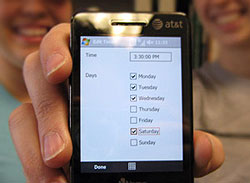REDMOND – May 12, 2009 – Can a trio of college students from Indiana with a silly name become a voice of authority on global health issues? Thanks to the Imagine Cup 2009 competition, the answer is possibly “yes.”

Team MangoBunnies: From left, Malisa Vongskul, Purdue School of Engineering and Technology in Indianapolis; Ashley Myers, DePauw University; and Erin Donahue, DePauw University.
The Imagine Cup is Microsoft’s annual global technology competition. In it, teams of talented young people from around the world compete to solve some of the world’s biggest problems as identified by the United Nations in its Millennium Development Goals —from halving extreme poverty and halting the spread of HIV/AIDS to providing universal primary education.
The trio from Indiana comprises three university students – Erin Donahue, 22, attending DePauw University; Ashley Myers, 21, also of DePauw University; and Malisa Vongskul, 21, of the Purdue School of Engineering and Technology in Indianapolis.
Their team name — Team MangoBunnies – says a lot about their spirit.
The MangoBunnies didn’t win the software design finals of the U.S. segment of the Imagine Cup competition, held May 2–5, in Cambridge, Mass. – three brothers from Oregon did so with an application that enables several students to simultaneously use a single computer through multiple mice. But the MangoBunnies were first runner-up, and their entry caught the imagination of many. Called CAMRA (for Computer-Assisted Medication Regimen Adherence program), it is a tool that keeps HIV and AIDS patients mindful of their medication timing via their mobile devices.
The subject seemed like a natural. Donahue’s mother, Carol Boushey, a professor in Foods and Nutrition at Purdue University, had recently traveled to Kenya to help HIV/AIDS patients with their diets. Myers’ mother, Brenda White, also works in health care. Myers herself worked as an intern in the health-care system. Donahue’s mom suggested creating something to help people take their medication. A little research showed that it could be a powerful idea.
“The thing about medication adherence rates is currently they sit around 70 percent,” Donahue says. “For an HIV/AIDS regimen to be effective, it has to have at least a 90 percent adherence rate.” If a person forgets to take their meds too often, the virus can start to have mutations that make it drug resistant.
“The drug-resistant strain is awful for two reasons,” Donahue explains. “The regimen is not effective anymore. Also, if someone else is infected, they have the drug-resistant strain, too.”

The MangoBunnies ramped up quickly on C#, ASP.NET and XML to develop “CAMRA,” for Computer-Assisted Medication Regimen Adherence. This software application for mobile phones is designed to remind HIV/AIDS patients take their medication.
The three Team MangoBunnies members met in an introductory computer science class three years ago and have been friends ever since. Donahue, the project lead, convinced the team to sign up for Imagine Cup. This year, students were required to come up with technology that aligns with the UN Millennium Development Goals. In other words, fight hunger and poverty, eradicate AIDS, and improve education, maternal health, and environmental sustainability.
To create their entry, Team MangoBunnies got to work learning programming languages such as C#, ASP.NET, and XML. Put simply, their software application is a sophisticated mobile phone alarm. “It’s just the same as any alarm you’d find on a phone,” Myers says.
The MangoBunnies’ simple way of helping HIV/AIDS patients dazzled Imagine Cup judges and caught the attention of their peers in an online People’s Choice Award vote. While thousands of students from more than 125 schools throughout the United States registered in this year’s U.S. Imagine Cup, only 15 teams advanced to the U.S. Imagine Cup 2009 Finals.
Vongskul is convinced that their device could be helpful for patients with diseases other than AIDS. “There are people who have to take multiple medications,” she said. “My godmother has had diabetes, lupus, and breast cancer. You should see her medicine cabinet.”
The college buddies were competing against some other pretty cool ideas. Team “Lucky Tomatoes” invented software to organize search and rescue teams. Team “Too Much Carbon Monoxide” came up with a tool to help combat pollution. Team “Safe Teen Driving” invented a way to stop teenagers from talking on their cell phones while they’re driving.
The winning team, Team MultiPoint, goes on to represent the United States at the Imagine Cup 2009 Worldwide Finals in Cairo, Egypt, July 3–9. Qualifying students will present their entries to a panel of judges from academia and the technology industry. Prizes for Imagine Cup 2009 will total more than $180,000 across the nine categories.
But while they won’t be in Cairo, it’s clear that Team MangoBunnies and the work they’ve done is bound to have lasting influence.




